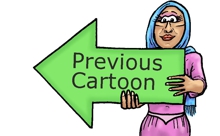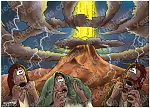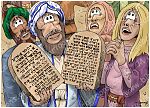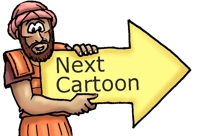Bible Cartoon: Exodus 32 - Golden Calf
Click on Add to cart button below shopping cart.
Purchased Bible Cartoons do not have watermarks. Links to Cartoons provided on email once purchase is completed.Bible Book: Exodus
Bible Book Code: 0203200101
Scene no: 1 of 2
Bible Reference & Cartoon Description
Exodus 32:1-35 (NLT)
The Gold Calf
1 When the people saw how long it was taking Moses to come back down the mountain, they gathered around Aaron. “Come on,” they said, “make us some gods who can lead us. We don’t know what happened to this fellow Moses, who brought us here from the land of Egypt.”
2 So Aaron said, “Take the gold rings from the ears of your wives and sons and daughters, and bring them to me.”
3 All the people took the gold rings from their ears and brought them to Aaron.
4 Then Aaron took the gold, melted it down, and molded it into the shape of a calf. When the people saw it, they exclaimed, “O Israel, these are the gods who brought you out of the land of Egypt!”
5 Aaron saw how excited the people were, so he built an altar in front of the calf. Then he announced, “Tomorrow will be a festival to the Lord!”
6 The people got up early the next morning to sacrifice burnt offerings and peace offerings. After this, they celebrated with feasting and drinking, and they indulged in pagan revelry.
7 The Lord told Moses, “Quick! Go down the mountain! Your people whom you brought from the land of Egypt have corrupted themselves. 8 How quickly they have turned away from the way I commanded them to live! They have melted down gold and made a calf, and they have bowed down and sacrificed to it. They are saying, ‘These are your gods, O Israel, who brought you out of the land of Egypt.’”
9 Then the Lord said, “I have seen how stubborn and rebellious these people are. 10 Now leave me alone so my fierce anger can blaze against them, and I will destroy them. Then I will make you, Moses, into a great nation.”
11 But Moses tried to pacify the Lord his God. “O Lord!” he said. “Why are you so angry with your own people whom you brought from the land of Egypt with such great power and such a strong hand? 12 Why let the Egyptians say, ‘Their God rescued them with the evil intention of slaughtering them in the mountains and wiping them from the face of the earth’? Turn away from your fierce anger. Change your mind about this terrible disaster you have threatened against your people!
13 Remember your servants Abraham, Isaac, and Jacob. [1] You bound yourself with an oath to them, saying, ‘I will make your descendants as numerous as the stars of heaven. And I will give them all of this land that I have promised to your descendants, and they will possess it forever.’”
14 So the Lord changed his mind about the terrible disaster he had threatened to bring on his people.
15 Then Moses turned and went down the mountain. He held in his hands the two stone tablets inscribed with the terms of the covenant. [2] They were inscribed on both sides, front and back. 16 These tablets were God’s work; the words on them were written by God himself.
17 When Joshua heard the boisterous noise of the people shouting below them, he exclaimed to Moses, “It sounds like war in the camp!”
18 But Moses replied, “No, it’s not a shout of victory nor the wailing of defeat. I hear the sound of a celebration.”
19 When they came near the camp, Moses saw the calf and the dancing, and he burned with anger. He threw the stone tablets to the ground, smashing them at the foot of the mountain.
20 He took the calf they had made and burned it. Then he ground it into powder, threw it into the water, and forced the people to drink it.
21 Finally, he turned to Aaron and demanded, “What did these people do to you to make you bring such terrible sin upon them?” 22 “Don’t get so upset, my lord,” Aaron replied. “You yourself know how evil these people are.
23 They said to me, ‘Make us gods who will lead us. We don’t know what happened to this fellow Moses, who brought us here from the land of Egypt.’ 24 So I told them, ‘Whoever has gold jewelry, take it off.’ When they brought it to me, I simply threw it into the fire—and out came this calf!”
[1]
Hebrew, Israel. The names “Jacob” & “Israel” are often interchangeable throughout the Old Testament, referring sometimes to the individual patriarch & sometimes to the nation.
[2]
Hebrew, the 2 tablets of the Testimony; see note on 25:16.
Note on Exodus 25:16.
Hebrew, Place inside the Ark the Testimony; similarly in 25:21. The Hebrew word for “Testimony” refers to the terms of the Lord’s covenant with Israel as written on stone tablets, & also to the covenant itself.
DRAWING NOTES:
TIME OF DAY:
Indeterminate – day time, morning (sun rises from the left) long shadows make it early morning.
LIGHTING NOTES:
Natural, sunlight.
CHARACTERS PRESENT:
Moses (holding 2 stone tablets), Aaron (hiding behind rock near path that goes up to the summit of mt. Sinai, various revelers & dancers, musicians, etc.
RESEARCH/ADDITIONAL NOTES:
Google earth position & orientation – 28 deg 33’ 08.39” N 33 deg 58’ 42.44” E Looking due S. The summit of mt. Sinai has a google earth yellow placement marker on it!
Although I used this view from google earth as the basis of this cartoon (with an identical background), the foreground has been changed to show a close up of the mountain rocks & a path that goes off towards the summit of mt. Sinai.
I looked up the Hebrew text for the 10 commandments & have managed to write all of the first 2 on the top stone tablet, in Hebrew!
I research Hebrew dancing on the internet & found examples of several people engaged in it: used those images to help me to draw the dancing figures in my cartoon.
This is the first time I have attemted to draw gold. Use of contrasting light & dark yellow, orange, brown shades are effective. Highlight in white makes the gold look shiny.
This is the first cartoon that i have drawn that has Moses in it. I am also currently colouring the Transfiguration, from Luke 9. The 3rd scene has Moses in it, so the colouration I have created in the Golden calf can be directly applied to that scene as well.
Bible Doctrine Notes
32:1 GOD, One God (1.11F)
Despite the mighty work of deliverance the Lord God brought about to save the Hebrew people from the Egyptians, the people soon turned to other gods. Far from being a problem in ancient times, modern people do the same thing. We often treasure or depend upon something which then takes our attention, and fills our minds and hearts with things instead of reserving those places for God alone. These idols and false gods can be far more subtle but nonetheless damaging to our spiritual relationship with God.
32:1 HUMANITY, Spiritual Nature (2.42C)
The spiritual nature of people drives them to search for, or create, something to worship or serve.
32:2-8 HISTORY, Worship (3.35B)
It is possible to use the right statements, but directed towards the wrong god. Worship of the God of history should not be directed towards to historical gods made by human hands. In no way does these false images represent the true God. God is shown by what He has done in history, not by what man has made.
32:7-9 SIN, Disobeying (2.53A)
Whilst Moses was up the mountain the people turned to idolatry and made a false god in the form of a golden calf. Their sin was disobedience to God’s command not to built any image to worship. This example serves to illustrate that even God’s people can easily attribute their welfare to something or someone other than the true God. Human impatience never justifies disobedience.
32:10, 12, 34-35 GOD, Wrath (1.14H)
While Moses was on the mountain communing with God, the Hebrew people were kindling God’s wrath by making a golden calf idol for themselves. God would have been fully justified in abandoning or even destroying the new nation of Israel then and there. But God tempered His wrath in response to Moses’ plea on behalf of the nation. Love, compassion and mercy are God’s dominant characteristics. Therefore God tempered the deserved judgement in a way that would still be a solemn warning yo the nation in the future. To have overlooked their sin would not have been just, or loving.
32:11-14 PRAYER, Intercession (5.54E)
Intercessory prayer is effective; Moses based his own version on the faithfulness of God to the covenant they had made together. (See note on Genesis 15:2-3). God relented (Hebrew nichan, “be sorry, have com passion”) from the disaster (Hebrew ra’ah, “evil”) He had announced. Prayers show the attitude and faith of the person praying and leads Him to act in accordance with His righteous will. (See note on v erse 32).
32:13-14, 34-35 HISTORY, Promise (3.33B)
God is committed to His promises, even in the face of rebellious people, but is free to fulfill His promises as He chooses. In fulfilling His promises, God builds His reputation among the nations of the world. He is free to punish anyone for disobedience, since the possession of the promise does not automatically result in obedience to that promise. God is free to relent or turn from His announced punishment in answer to prayer and in light of His purposes.
32:13-14 ELECTION, Prayer (4.15E)
Moses asked God to turn away from His anger with His people’s idiolatry and disobedience by appealing to God’s covenant with their ancestors Abraham, Isaac and Jacob/Israel. Election gives God’s elect people courage to pray in times of crisis, but it also gives God freedom to punish or relent from punishing His people for their sins against Him.
32:21-24 SIN, Responsibility (2.53J)
Aaron’s lame excuse regarding the origin of the golden calf shows that he refused to accept responsibility for his sin. His story obviously contradicts that recorded in verses 1-6. Blaming other people is not an excuse or escape fro the responsibility of a sin. Joining the sin of other people remains a personal choice for which we are personally responsible to God for.
32:30-32 SALVATION, Atonement (4.23A)
Atonement by personal intercession was the only way Moses could see to restore relationships between God and the nation Israel, who had chosen to worship the golden calf idol rather than God. No other way of atonement could deal with this rejection of God. Moses was willing to sacrifice his own relationship with the Lord God, in order to restore the entire nation of Israel’s relationship with God. This is a model, foreshadowing the once for all atonement Jesus Christ wrought upon the cross, offering his own life in eternal atonement for all sinners.
32:30-34 DISCIPLESHIP, Spiritual Leaders (4.33F)
God rejected Moses offer of self-sacrifice for the idolatrous sins of the Hebrew people, and told hi to continue to do as He had commanded. Moses learnt that his own intercession for the people could never avert God’s judgement. Moses leadership had achieved much for the Hebrew people, but his self-sacrficing love could not provide full atonement for their own sins. It is right for spiritual leaders to put the welfare of the people above their own welfare and self interests, nevertheless, leaders must be willing to abide by God’s decisions and continue to follow God’s leadership.
32:32 PRAYER, Intercession (5.54E)
Moses request was not an attempt at bargaining with God, rather it demonstrated his strong identity with the people he was praying for, which is a very important principle of prayer. Even self-sacrifing intercession is not effective for an unrepentant people.





